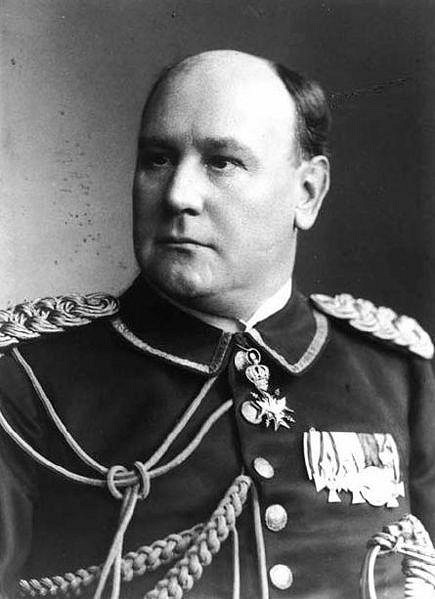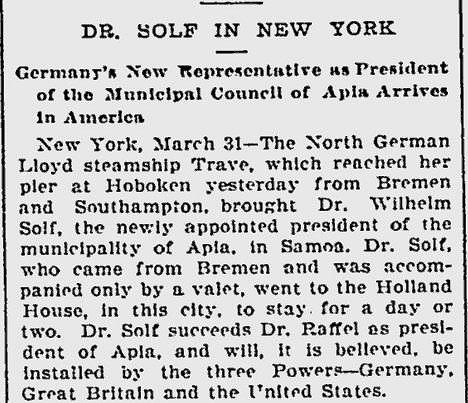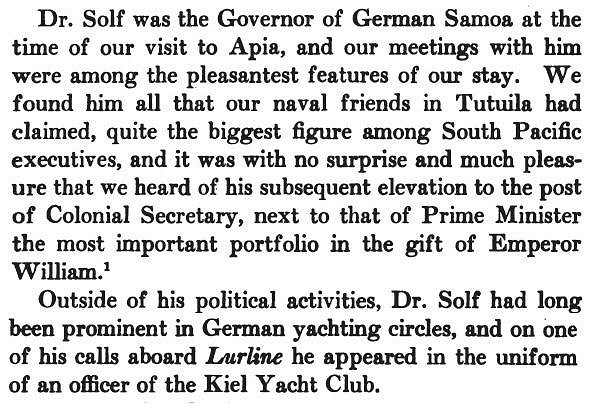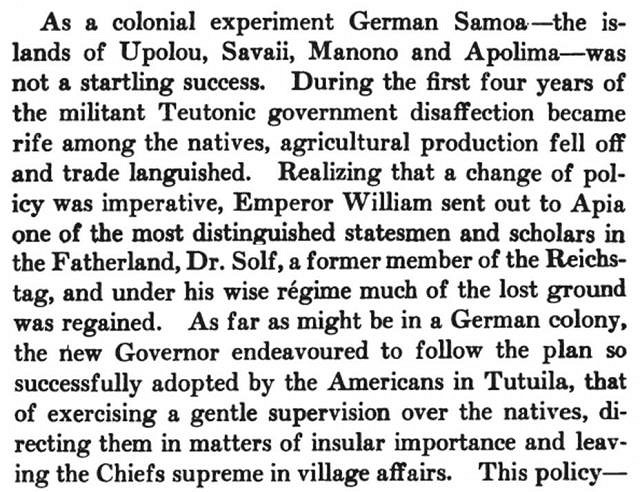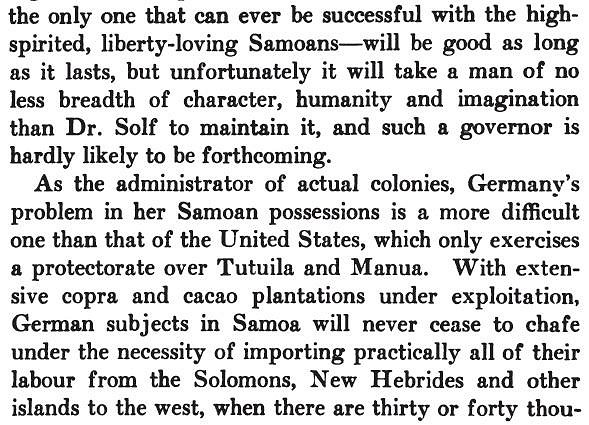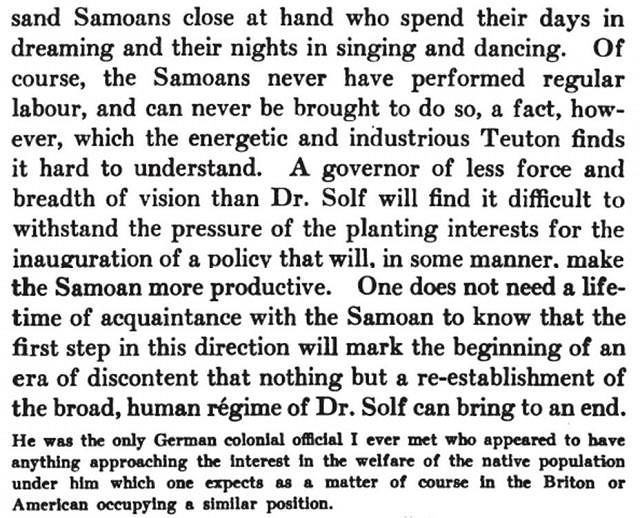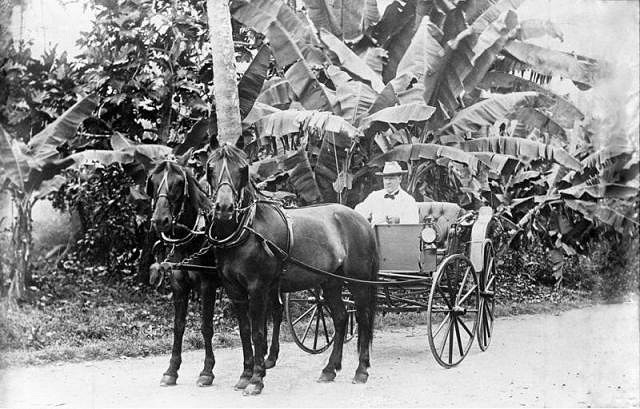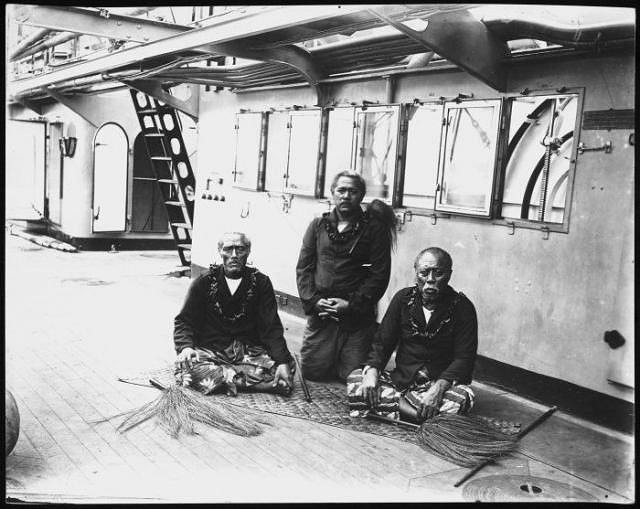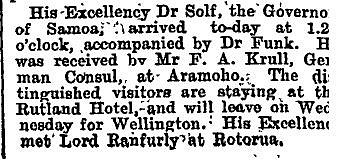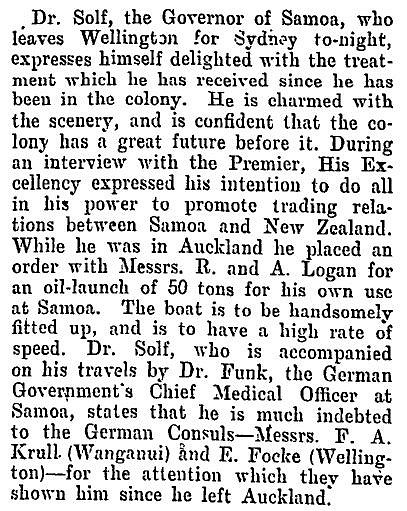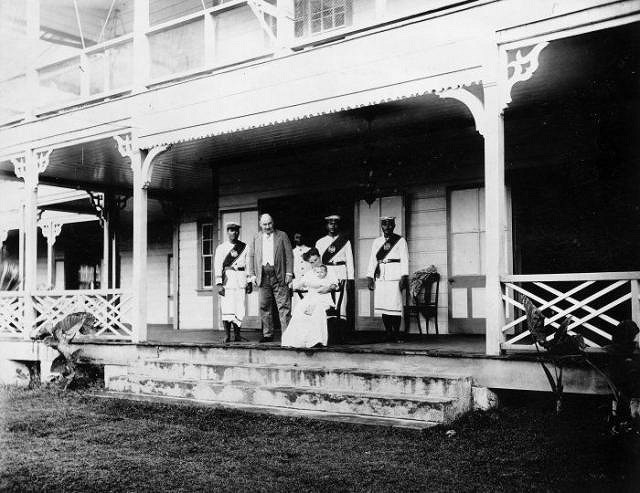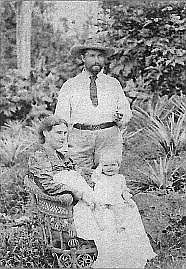Tiki Central / Tiki Drinks and Food / The real Dr. Funk
Post #631673 by TikiTomD on Sat, Apr 7, 2012 5:08 PM
|
T

TikiTomD
Posted
posted
on
Sat, Apr 7, 2012 5:08 PM
In February of 1900, the three colonial powers with interests in Samoa formally ratified agreements proposed in the Tripartite Convention of 1899. In accordance with these agreements, Western Samoa (Upolu, Savai`i, Apolima and Manono) became a protectorate of Germany. Eastern Samoa (principally Tutuila with its harbor, Pago Pago) was ceded to the United States. The United Kingdom was compensated by the handover of former German interests in Tonga, the Solomon Islands, West Africa (division of the neutral zone) and Zanzibar. Dr. Wilhelm Solf, one of Germany’s finest civilian diplomats, was appointed as the Imperial German Governor of German (Western) Samoa. He was 38 years old at the time...
Just the year before, in 1899, Dr. Solf had been appointed as President of the Apia Municipal Council, a multi-national provisional government. This newspaper article about that appointment has some good biographic data on Dr. Solf… Boston Evening Transcript March 31, 1899 (page 1) Bigbrotiki, note the reference to student dueling scars... Solf had a prominent “schmiss” on his chin. The American explorer and journalist, Lewis R. Freeman, wrote about Solf in his travelogue, In the Tracks of the Trades, published in 1921...
On Dr. Solf’s effectiveness as German Governor of Western Samoa, Freeman went on to say...
Dr. Solf was noted to be both humane and tolerant, but decisively acted whenever and wherever his imperial authority was questioned. There were some other dimensions to Wilhelm Solf that have bearing on his relationship with Dr. Funk. Solf strongly believed that people should stay in their own racial lanes, so to speak. He found intermarriage with the Samoan natives to be abhorrent, as observed by Peter Hempenstall and Paula Mochida in their 2005 book, The Lost Man – Wilhelm Solf in German History...
Dr. Funk, like many of the old time settlers and small plantation owners, had married native Samoan women. That made them all moral degenerates in the view of Solf, who likewise discounted their claims and ties to Samoa as a new home. In part, Solf felt a fatherly obligation to protect the native Samoan people from corruption by these settlers. On the debilitating effects of climate, Leilani Burgoyne in “Going ‘Troppo’ in the South Pacific: Dr. Bernhard Funk of Samoa 1844–1911” noted that Solf believed in a condition referred to as Troppenkoller, a form of tropical madness affecting settlers from northern climates brought on by the sustained exposure to high heat and humidity in Samoa and other South Seas islands. This condition caused those affected to lose their sense of perspective and react psychologically in incomprehensible ways. In his view, twenty five years was the maximum limit of exposure before even the hardiest of Europeans succumbed either to the effects of the climate or the seductive wiles of native women. On the latter point, I’d say that Solf was being way too generous. Based purely on elapsed time of exposure, Dr. Funk was on the verge of going “Troppo.” Hempenstall and Mochida in The Lost Man – Wilhelm Solf in German History go on to explain the underpinnings of Solf’s native policy...
Dr. Solf seriously underestimated the native Samoans, especially the wily intelligence of one of their great orator chiefs, Lauaki Namulau`ulu Mamoe. The orator chiefs (tulafale) were the kingmakers among Samoan royalty, and Solf’s policies disenfranchised their position. Solf would later bitterly regret that miscalculation, as subsequent insurrection forced him to ship the great chief, supporting chiefs and families (nearly seventy people in all) into exile on the German Mariana Islands in the far North Pacific… **Lauaki Namulau'ulu Mamoe and other chiefs, aboard a German warship, 1909 After taking office as Imperial Governor of Western Samoa in March of 1900, Dr. Solf established a permanent post for a government medical officer. Solf had serious reservations about the obvious candidate, Dr. Bernhard Funk, due to the issues cited above and Funk’s stubbornly independent, even “cheeky” nature, according to the evidence uncovered by Leilani Burgoyne. In the end, Dr. Funk’s popularity across all elements of the community and his solid medical reputation caused the administration to award him the post of Harbor Doctor. At the time, Dr. Funk was 55 years old. Interestingly, Leilani found that Dr. Funk was unable to produce his medical papers, so he was forced to share his official responsibility with another German physician. None of this bode well for a happy working relationship between the Imperial Governor and his new employee. Dr. Solf and his new medical officer, Dr. Funk, went on a diplomatic and trade tour of New Zealand and Australia in 1901, according to these newspaper articles of the time... The Wanganui Herald March 18, 1901 The Evening Post March 23, 1901 **Dr and Mrs Solf at Vailima, 1900s Once Dr. Funk accepted his government post, the Imperial Governor and his administration determined who Dr. Funk’s patients were, and these were typically Samoans of significant political influence. As he feared, Solf repeatedly found his doctor unresponsive to his requests. Leilani cites a 1903 letter from Solf to Funk demanding an explanation as to why he, Funk, had not attended to the *Ali In 1904, Dr. Funk was accused by the Imperial Governor of doing the unforgiveable, consorting with his arch political foe, Dr. Richard Deeken, a reserve army officer and head of the small planters’ association known as the Planters’ Society (Pflanzerverein). Malama Meleisea and Penelope Schoeffel Meleisea summarized Solf’s situation with Deeken in their 1987 book, Lagaga: A Short History of Western Samoa...
**Dr Richard Deeken**, his wife Elisabeth and their first child "Else Josepha Moana,” 10 month old godchild of the last king of Samoa, Josefa Mata'afa (1903) According to Leilani, the records reveal that Solf accused Dr. Funk of “showing off with Deeken in the street” after having him over for dinner. Dr. Funk proclaimed his innocence, saying that he knew Deeken in his capacity as physician only and that he was willing to swear an oath that he had no part in slandering the German administration. Solf evidently decided he’d had enough. He declared Dr. Funk had gone “Troppo” and abolished his post as Harbor Doctor on July 1, 1904. Dr. Funk was almost 60 years old at the time and had been in Samoa more than twenty four years. Solf did allow Dr. Funk to continue in an official capacity collecting meteorological data for the Seewarte in Hamburg, as well as for the German Firm (D.H.P.G.). He also allowed Dr. Funk to intermittently serve the administration when other doctors weren’t available to attend patients. Here’s how Hempenstall and Mochida described the action in The Lost Man – Wilhelm Solf in German History...
Dr. Wilhelm Solf left Samoa in 1910 to be appointed Colonial Secretary at Berlin. Dr. Erich Schultz, his deputy and the former chief justice in the protectorate, succeeded him. Dr. Solf died in 1936... Rochester Journal February 6, 1936 (page 63) **Samoan address to outgoing German Governor, Dr Wilhelm Solf, 1910 For the rest of the story on Dr. Solf, see this Samoa Observer online article. Dr. Solf was a political moderate and opposed the rising National Socialist (Nazi) party in Germany. His wife, Johanna Solf, and their Samoan-born daughter, Lagi (So German Postcard of Samoa (1907) -Tom |

